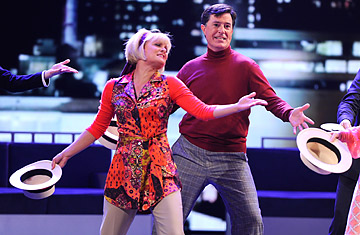
Martha Plimpton and Stephen Colbert perform a song from "Company" on stage during the 65th Annual Tony Awards at the Beacon Theater in New York on June 12, 2011.
(2 of 2)
Song after song describes this clashing ambivalence. Sondheim sometimes provides paired numbers expressing opposing viewpoints, as when the men sing Robert the waltz medley "Have I Got a Girl for You" (a hot item who might also be wife material) and "Whaddaya Wanna Get Married For" (which squeezes sour grapes out of married bile). In two interlocking vaudeville-style songs, "Side by Side by Side" extols the joys of marriage and friendship, while "What Would We Do Without You" praises Robert as the single friend the condemned can complain to and envy. The contradictions are brilliantly crystallized in two other numbers. "Sorry-Grateful" is a meditation on marital tradeoffs ("Good things get better / Bad get worse / Wait, I think I meant that in reverse"); "Marry Me a Little" searches for a golden, probably impossible ideal of emotional moderation ("Marry me a little / Love me just enough / Cry, but not too often / Play, but not too rough").
Sondheim bundles up these compromises and fantasies for most of the show, then releases them in a final solo, "Being Alive," in which Robert realizes that any sustained form of intimacy ("Someone to hold you too close / Someone to hurt you too deep") is both a blessing and a curse, demanding a masochistic or heroic commitment that not he's not suited or ready for. Marriage, Company suggests, is the worst way to live — except for all the other ways. The play ends where it began, with Robert's 35th birthday, except that now his friends have not thrown a surprise party for him, and he's left wondering if being alone is really being alive. The smile that flits across Harris's face in the second before the final blackout indicates that the answer is… yes, a little.
An ancillary pleasure of a concert revival is the congestion of on-stage talent that could not be corralled for a long run. Katie Finneran, a Tony winner with hr steal-stealing role in last year's Promises, Promises revival, commits further light larceny with a hilariously manic, flawlessly articulated rendition of the insane patter song "Not Getting Married." Anika Noni Rose, who won a Tony in 2004 for Caroline, or Change, does passionate justice to Sondheim's New York anthem "Another Hundred People." Jennifer Laura Thompson, late of Urinetown and Wicked, brings a delightful naïveté to her stoned-on-brownies scene. The big stage star here is LuPone, Broadway's diva of divas — and a taste I have yet to acquire in the 32 years since I first saw her in Evita. Isherwood cited LuPone's "Ladies Who Lunch" as a lesson in Broadway singing. He means she really belts it out; but for LuPone, belting is like the application of a strap to a naughty child's backside. Instead, give me the version of "Ladies Who Lunch" done last year on Broadway by Dame Edna Everage — the drag artiste Barry Humphries. Now that was showbiz panache.
And the TV interlopers? For the most part, they do fine. Only Colbert is subpar, and it kills me to say that, since on The Colbert Report he's a magnificent comic actor, satirizing his egotistical right-wing blowhard TV character even as he seems to live inside the faux-Colbert. On stage, though, deprived of his trademark spectacles and wearing a red sweater that does not compliment his physique, he looks awkward, and he stalks "Sorry-Grateful" like a barroom Irish tenor revving up for "Danny Boy." But it's a distinctly minor role; and Plimpton, as his wife, fully commanded her character's withering haughtiness. She ought to come back to Broadway tout de suite. Hendricks, playing a flight attendant who lands in Robert's bed, gives a wonderfully innocent reading of a dim, beautiful babe, which more than atones for the tentative approach to her one duet, "Barcelona." That memory will fade; Hendricks' monologue will continue to warm the heart.
It's true that Harris, who sang for real in the Josh Whedon musical comedy Dr Horrible's Sing-Along Blog, doesn't attack "Being Alive" with the full-throated despair Esparza imparted in the 2006 revival. (Then again, for that production each singer-actor also had to play a musical instrument and tote it around. It was as if the glee club suddenly was drafted to be the school band.) But not every song has to be an aria, especially not one delivered by the even-tempered Robert. Esparza tore out his entrails in that final number; Harris gets the character's loneliness across without eviscerating himself. His ingratiating personality also shows (as Esparza's edgier performance did not) why everyone would want Robert as a friend. An actor-singer with the emphasis on the former, Harris is perfectly in tune with Price's masterly balancing act.
I thought I'd be sorry that this mashup of Broadway and TV actors would be available for viewing by the movie masses. Instead, I'm profoundly grateful. It makes great summer company.
